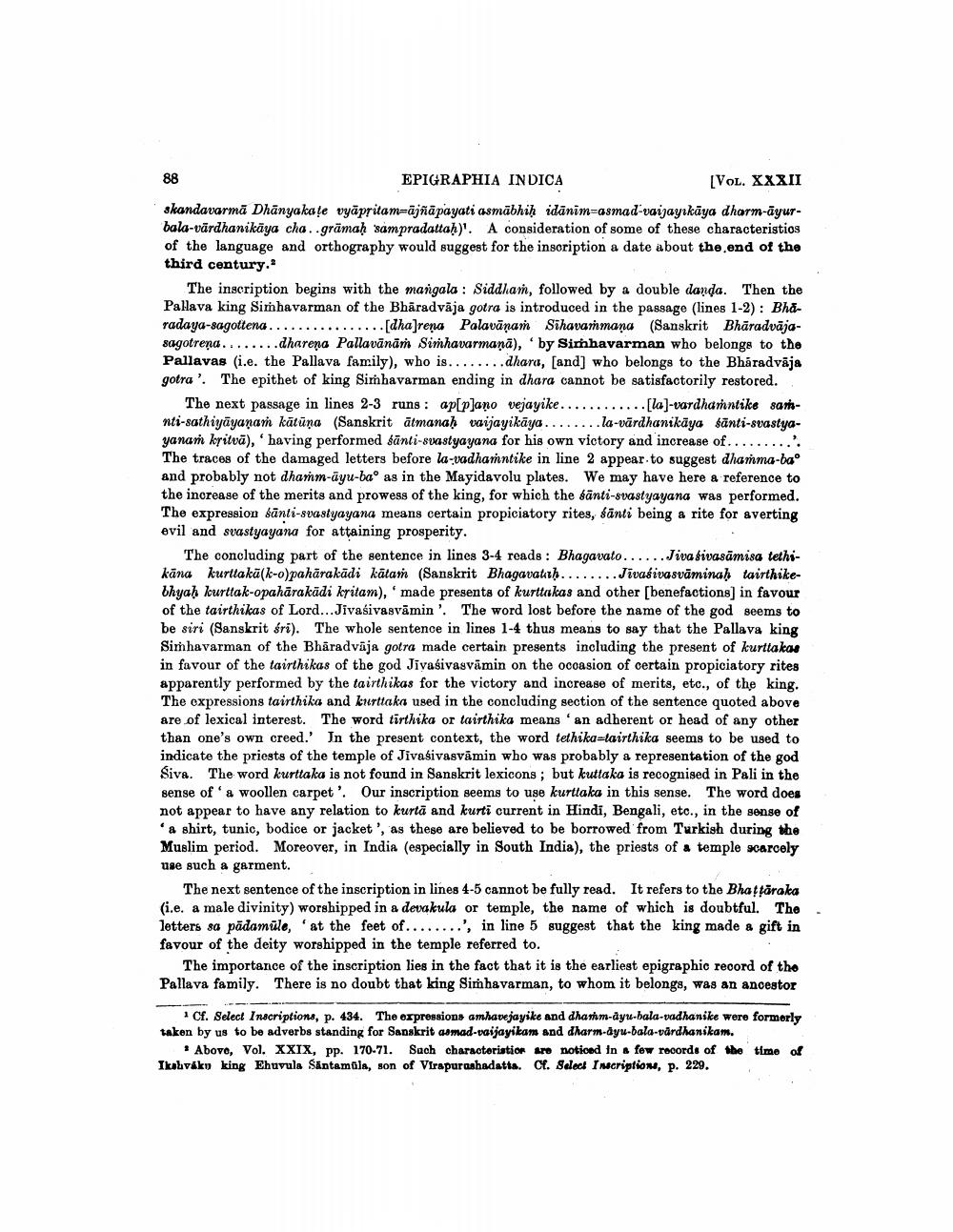________________
EPIGRAPHIA INDICA
[Vol. XXXII skandavarmā Dhānyakaļe vyāpritam=ājñāpayati asmābhiḥ idānim-asmad-vaijayrkāya dharm-āyurbala-vārdhanikāya cha..grämah sampradattah)'. A consideration of some of these characteristios of the language and orthography would suggest for the inscription a date about the end of the third century."
The inscription begins with the mangala : Siddhar, followed by a double danda. Then the Pallava king Simhavarman of the Bhāradvāja gotra is introduced in the passage (lines 1-2): Bharadaya-sagottena................(dha)rena Palavānam Sihavammana (Sanskrit Bhāradvājasagotrena........ dharena Pallavānāṁ Simhavarmanā), by Simhavarman who belongs to the Pallavas (i.e. the Pallava family), who is........ dhara, [and] who belongs to the Bharadvāja gotra'. The epithet of king Simhavarman ending in dhara cannot be satisfactorily restored.
The next passage in lines 2-3 runs : ap[p]ano vejayike............ [la]-vardhaṁntike sannti-sathiyāyanan kätūna (Sanskrit ātmanah vaijayikāya........la-värdhanikäya sānti-svastyayanań kritvā), having performed śānti-svastyayana for his own victory and increase of .......... The traces of the damaged letters before la-vadhamntike in line 2 appear to suggest dhamma-bao and probably not dhamm-ayu-bao as in the Mayidavolu plates. We may have here a reference to the increase of the merits and prowess of the king, for which the banti-evastyayana was performed. The expression sānti-svastyayana means certain propiciatory rites, fānti being a rite for averting evil and svastyayana for attaining prosperity.
The concluding part of the sentence in lines 3-4 reads : Bhagavato......Jiva sivasāmisa tethikāna kurttakā(k-o)pahārakādi kātam (Sanskrit Bhagavath........Jivasivasvāminah tarthikebhyah kurttak-opahārakādi kritam), 'made presents of kurttakas and other [benefactions) in favour of the tairthikas of Lord...Jivasivagvāmin'. The word lost before the name of the god seems to be siri (Sanskrit fri). The whole sentence in lines 1-4 thus means to say that the Pallava king Simhavarman of the Bhäradväja gotra made certain presents including the present of kurttakas in favour of the tairthikas of the god Jivasivagvāmin on the occasion of certain propiciatory rites apparently performed by the tairthikas for the victory and increase of merits, etc., of the king. The expressions tairthika and kurttaka used in the concluding section of the sentence quoted above are of lexical interest. The word tirthika or tairthika means 'an adherent or head of any other than one's own creed. In the present context, the word tethika=tairthika seems to be used to indicate the priests of the temple of Jivasivasvāmin who was probably a representation of the god Siva. The word kurttaka is not found in Sanskrit lexicons; but kuttaka is recognised in Pali in the sense of a woollen carpet'. Our inscription seems to use kurttaka in this sense. The word does not appear to have any relation to kurtā and kurti current in Hindi, Bengali, etc., in the sense of 'a shirt, tunic, bodice or jacket', as these are believed to be borrowed from Turkish during the Muslim period. Moreover, in India (especially in South India), the priests of a temple scarcely use such a garment.
The next sentence of the inscription in lines 4-5 cannot be fully read. It refers to the Bhattāraka (i.e. a male divinity) worshipped in a devakula or temple, the name of which is doubtful. The letters sa pādamūle, at the feet of........', in line 5 suggest that the king made a gift in favour of the deity worshipped in the temple referred to.
The importance of the inscription lies in the fact that it is the earliest epigraphic record of the Pallava family. There is no doubt that king Simhavarman, to whom it belongs, was an ancestor
1 Cf. Select Inscriptions, p. 434. The expressions amhavejayike and dhanm-dyr-bala-vadhanike were formerly taken by us to be adverbs standing for Sanskrit asmad-vaijayikam and dharm-dyu-bala-vardhanikam.
Above, Vol. XXIX, pp. 170-71. Sach characteristion are notioed in few records of the time of Ikalváky king Ehuvula Santamala, son of Virspurashadatta. Cf. Select Inscription, p. 229.




